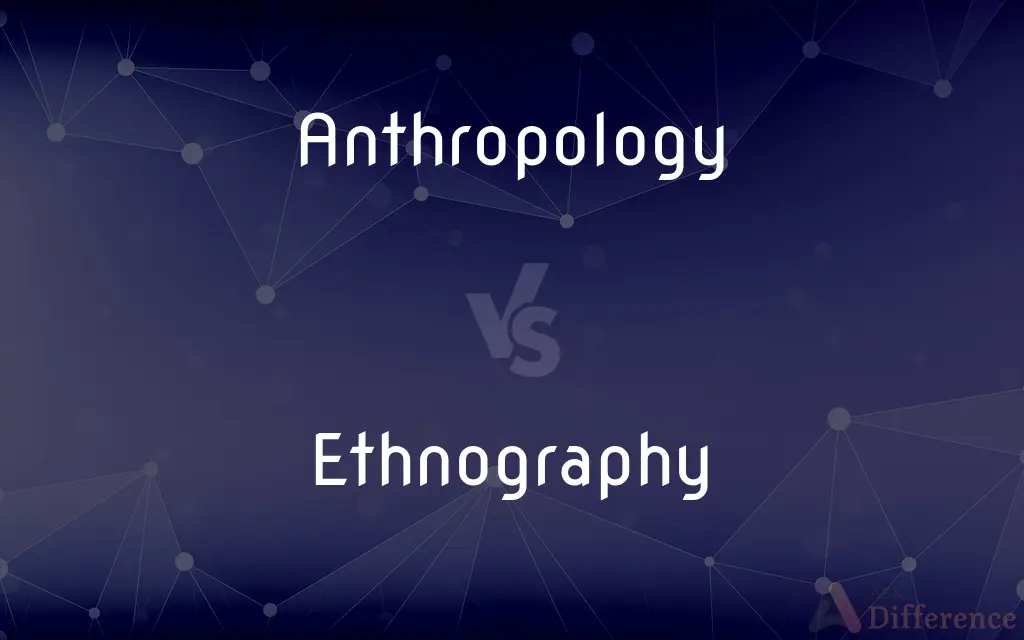Anthropology vs. Ethnography — What's the Difference?
Edited by Tayyaba Rehman — By Maham Liaqat — Updated on April 18, 2024
Anthropology is the broad study of human societies and cultures over time, while ethnography specifically refers to the detailed study and systematic recording of human cultures.

Difference Between Anthropology and Ethnography
Table of Contents
ADVERTISEMENT
Key Differences
Anthropology examines human societies and cultures from a broad perspective, considering various aspects such as evolution, behavior, and social structures. On the other hand, ethnography focuses more intensely on the detailed observation and description of individual cultures, primarily through fieldwork.
Anthropology often employs various methodologies, including archaeological, biological, and linguistic approaches, to understand the complexity of human conditions. Whereas ethnography is predominantly qualitative, relying heavily on participant observation and interviews to gather data.
Anthropologists may study a wide range of topics from prehistoric developments to modern social dynamics. Ethnographers, however, immerse themselves in specific cultural groups to understand their norms, values, and social practices from an insider's viewpoint.
While anthropology can be theoretical and encompass comparative studies of multiple cultures or long-term changes, ethnography typically produces detailed case studies of a single community or practice at a specific point in time.
In anthropology, theories and data can be used to make generalizations about human behavior and cultural patterns. In contrast, ethnography provides a rich, in-depth description of a culture, which can inform or challenge anthropological theories but focuses on specific instances rather than general patterns.
ADVERTISEMENT
Comparison Chart
Definition
The study of human societies and cultures over time.
The detailed study and recording of human cultures.
Focus
Broad, covering various aspects of human life.
Narrow, focused on detailed cultural documentation.
Methodologies
Uses archaeological, biological, and linguistic methods.
Primarily uses participant observation.
Scope
Can be global, studying multiple cultures.
Typically focuses on a single community.
Outcome
Often theoretical and comparative.
Produces descriptive, detailed case studies.
Compare with Definitions
Anthropology
Encompasses various branches like social, cultural, and physical anthropology.
She specializes in physical anthropology, focusing on human evolutionary biology.
Ethnography
Detailed documentation and analysis of a specific culture.
His ethnography on the fishing communities in Alaska spanned over two years.
Anthropology
Can involve fieldwork, but not as extensively as ethnography.
As part of her anthropology course, she conducted brief field research in urban settings.
Ethnography
Often used within anthropology to support broader analyses.
Her ethnographic work provides crucial insights into her broader anthropological thesis.
Anthropology
Focuses on both historical and contemporary issues.
Modern anthropology addresses both ancient human activities and contemporary societal changes.
Ethnography
Utilizes methodologies like participant observation and interviews.
She spent months living with the tribe, employing ethnography to gather her data.
Anthropology
Study of human races, origins, societies, and cultures.
Anthropology has helped us understand the social impacts of technology across different cultures.
Ethnography
Aims to represent the viewpoint of the study subjects.
Ethnography tries to present cultural phenomena from the perspective of its participants.
Anthropology
Often interdisciplinary, integrating sociology, economics, history, and more.
His anthropology research overlaps significantly with historical studies.
Ethnography
Produces rich, detailed descriptions of a community's way of life.
The ethnography vividly described the marriage rituals and festivity preparations.
Anthropology
Anthropology is the scientific study of humanity, concerned with human behavior, human biology, cultures and societies, in both the present and past, including past human species. Social anthropology studies patterns of behaviour, while cultural anthropology studies cultural meaning, including norms and values.
Ethnography
Ethnography (from Greek ἔθνος ethnos "folk, people, nation" and γράφω grapho "I write") is a branch of anthropology and the systematic study of individual cultures. Ethnography explores cultural phenomena from the point of view of the subject of the study.
Anthropology
The study of human societies and cultures and their development.
Ethnography
The branch of anthropology that deals with the description of specific human cultures, using methods such as close observation and interviews.
Anthropology
The scientific study of the origin, the behavior, and the physical, social, and cultural development of humans.
Ethnography
A text produced using such methods.
Anthropology
That part of Christian theology concerning the genesis, nature, and future of humans, especially as contrasted with the nature of God
"changing the church's anthropology to include more positive images of women" (Priscilla Hart).
Ethnography
(anthropology) The branch of anthropology that scientifically describes specific human cultures and societies.
Anthropology
The holistic scientific and social study of humanity, mainly using ethnography as its method.
According to anthropology, there are six basic patterns of kinship terminology (i.e., "kin naming systems"): Sudanese, Hawaiian, Eskimo, Crow, Omaha, and Iroquois.
Ethnography
An ethnographic work.
Anthropology
The science of the structure and functions of the human body.
Ethnography
That branch of knowledge which has for its subject the characteristics of the human family, developing the details with which ethnology as a comparative science deals; descriptive ethnology. See Ethnology.
Anthropology
The science of man, including the study of the ditribution of physical and cultural attributes in relation to man's origin, location, history, and environment; - sometimes used in a limited sense to mean the study of man as an object of natural history, or as an animal.
Ethnography
The branch of anthropology that provides scientific description of individual human societies
Anthropology
That manner of expression by which the inspired writers attribute human parts and passions to God. See also anthropopathite, anthropopathism, anthropomorphist.
Anthropology
The social science that studies the origins and social relationships of human beings
Common Curiosities
Can an anthropologist be an ethnographer?
Yes, many anthropologists conduct ethnographic research as part of their studies into human cultures.
How does the methodology differ between anthropology and ethnography?
Anthropology can use a range of methods, including archaeological and biological approaches, whereas ethnography primarily involves qualitative methods like participant observation.
What is the main difference between anthropology and ethnography?
Anthropology is a broad discipline studying human societies and cultures, while ethnography focuses on the detailed study of specific cultures.
Can ethnography be considered a part of anthropology?
Yes, ethnography is often a component of anthropological studies, providing detailed cultural insights that support broader anthropological research.
How do the objectives of anthropology and ethnography differ?
Anthropology aims to broadly understand and explain aspects of human societies and their development, while ethnography focuses on gaining a deep understanding of the internal workings and daily life of a specific cultural group.
In what settings might an anthropologist work compared to an ethnographer?
Anthropologists might work in a variety of settings including universities, museums, and policy institutes; ethnographers are more likely to be found in the field, deeply engaged within the communities they study.
Can ethnographic research influence public policy?
Yes, ethnographic research can provide detailed insights into community needs and behaviors, which can be invaluable for designing effective and culturally sensitive public policies.
What are some common misconceptions about anthropology and ethnography?
A common misconception is that anthropology always involves fieldwork in remote areas, whereas it can be theoretical or involve urban and contemporary societies; similarly, ethnography is sometimes mistakenly seen as merely anecdotal rather than a rigorous research method.
What skills are essential for ethnographers that might not be as crucial for anthropologists?
Ethnographers require strong skills in qualitative data collection, such as observing without influencing the environment and conducting in-depth interviews, which are less emphasized in some other branches of anthropology.
What kind of educational background is necessary to become an ethnographer or an anthropologist?
Both fields typically require advanced degrees in anthropology or related disciplines, with specific training in ethnographic methods for ethnographers.
Are there any specific outcomes associated with ethnography compared to anthropology?
Ethnography typically results in detailed case studies, while anthropology might result in broader theories and comparative analyses.
How do anthropology and ethnography contribute to our understanding of globalization?
Anthropology provides insights into how global forces shape cultural identities, economies, and social structures, while ethnography offers a ground-level view of how global processes affect individual communities and everyday lives.
How has technology impacted the fields of anthropology and ethnography?
Technology has expanded the tools available for both fields, enabling virtual ethnography and the use of digital archives and databases in anthropological research, enhancing data collection and analysis.
How do anthropologists and ethnographers present their findings?
Anthropologists often present their findings through academic papers, books, and lectures, while ethnographers might also produce detailed case studies, documentary films, and exhibitions.
What ethical considerations are unique to ethnography?
Ethnographers face unique ethical challenges, including the need for informed consent, ensuring anonymity, and navigating potential impacts on the communities they study due to their immersive research methods.
Share Your Discovery

Previous Comparison
Dance vs. Soccer
Next Comparison
Corded vs. WiredAuthor Spotlight
Written by
Maham LiaqatEdited by
Tayyaba RehmanTayyaba Rehman is a distinguished writer, currently serving as a primary contributor to askdifference.com. As a researcher in semantics and etymology, Tayyaba's passion for the complexity of languages and their distinctions has found a perfect home on the platform. Tayyaba delves into the intricacies of language, distinguishing between commonly confused words and phrases, thereby providing clarity for readers worldwide.














































